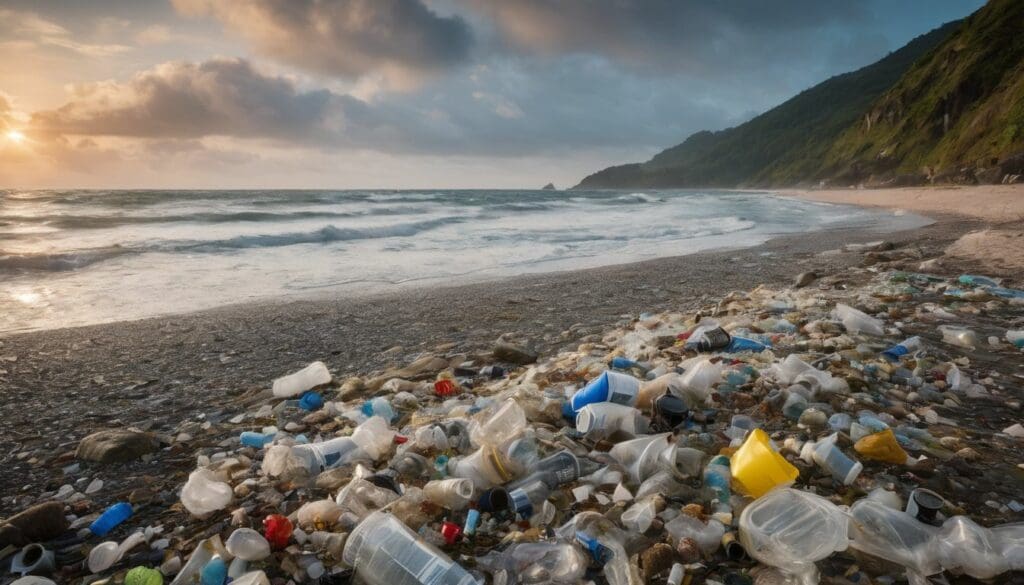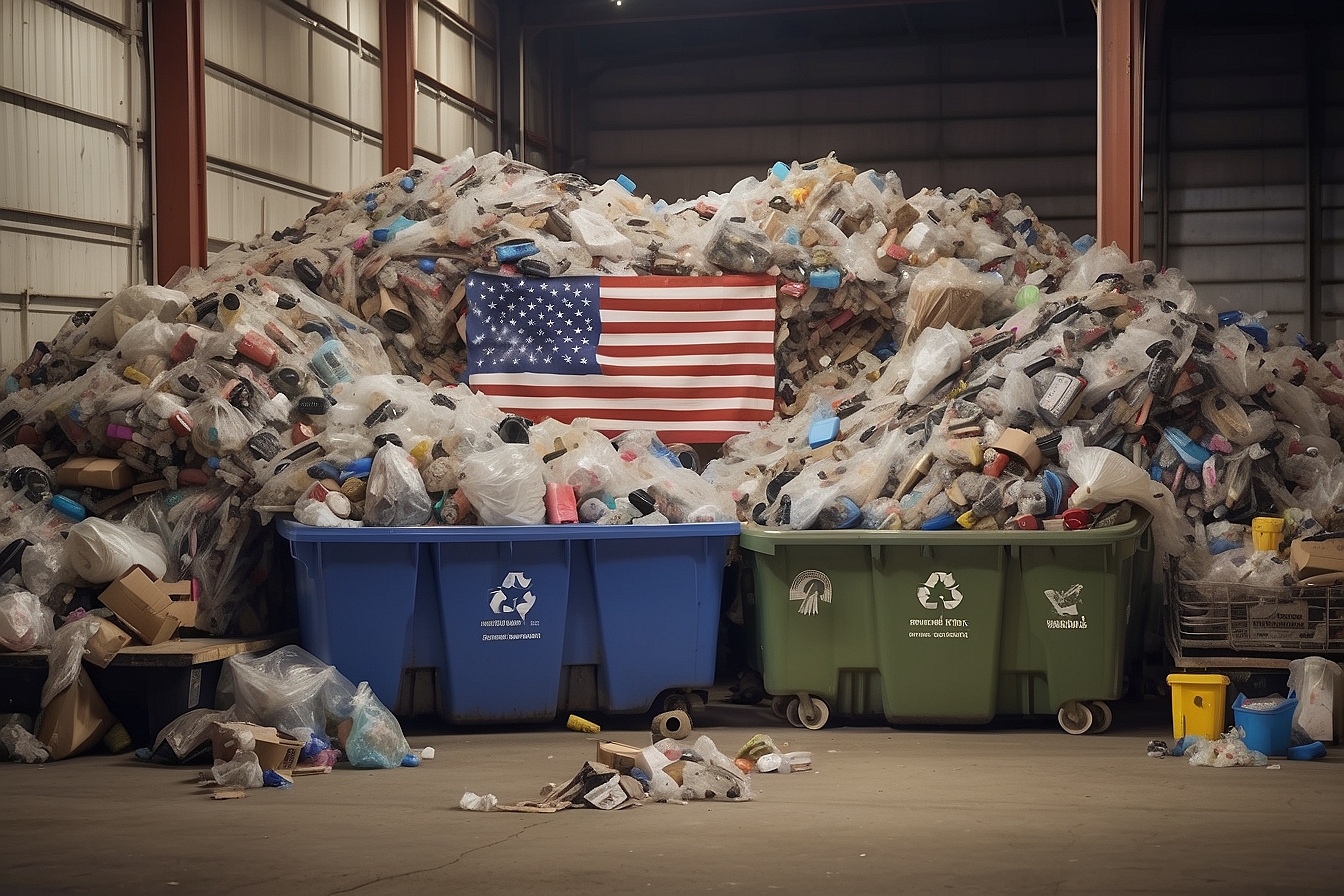The sight of plastic debris littering the once pristine shores abroad is a jarring image that haunts many of us. It’s an uncomfortable truth, isn’t it? The fact that nearly 13 million tonnes of plastic are carelessly discarded into the oceans annually is not just a statistic; it represents a profound challenge to our collective conscience.
In today’s post, we’re delving into the somewhat murky realm of waste exportation ethics with a genuine desire to shed light on more sustainable practices. Continue reading as we join hands in seeking out practical steps towards forging an environmentally respectful path for generations to come.
Let’s navigate these choppy waters together and chart a course towards a cleaner and more accountable future.
Key Takeaways
- Exporting waste to poorer countries damages their economies and environments because they may not have the right systems to handle it safely.
- Not dealing with our own rubbish properly causes pollution, like dirty air and water, which can make people sick and hurt animals and plants too.
- When we send our trash away, it’s unfair to other places and is against the rules of being good to each other globally. We need to take care of our own mess.
- Making better rules for throwing away trash, building places that can recycle more stuff, and using less will help stop the need to send waste abroad.
- By looking after our own waste at home instead of sending it away, we show that we’re responsible and help keep Earth safe for everyone in the future.
The Impact of Waste Exportation
Waste exportation has significant economic, environmental, and ethical consequences. It affects the economies of countries involved in the waste trade, contributes to environmental pollution, and raises ethical concerns about fair trade practices and responsible waste management.
Economic consequences
We face several economic consequences when we export waste, especially to countries in the Global South. These regions often lack the infrastructure to manage the influx of foreign waste properly, leading to mismanaged disposal and significant costs associated with environmental cleanup efforts.
Industries in developed nations save money by offloading their waste management responsibilities onto poorer countries. However, this short-term saving comes at a high price for both local economies where waste piles up and for global trade relations that risk being strained by unfair practices.
The practice impacts job markets too. It undercuts local recycling businesses that are unable to compete with the cheap labour available overseas. This not only leads to lost jobs but also hampers innovation in sustainable development within our own borders.
We must acknowledge how our exported trash can undermine economic stability elsewhere, perpetuating cycles of poverty and pollution instead of fostering environmental sustainability and fair trade practices.
Environmental consequences
Exporting waste to other countries has severe environmental consequences. It leads to increased pollution, particularly in the receiving countries, as they often lack the proper infrastructure for safely managing and disposing of the waste.
This can result in contamination of soil, water sources, and air quality, harming local ecosystems and endangering the health of residents. Furthermore, shipping waste over long distances contributes to greenhouse gas emissions, worsening global climate change and further impacting the environment.
As we explore the environmental consequences of waste exportation, it becomes evident that urgent action is needed to address these issues and protect our planet for future generations.
Ethical considerations
Exporting waste to other countries raises ethical concerns about the responsible management of our own waste. We must consider the impact on communities and environments in these countries, as well as whether it is fair to shift the burden of our waste onto others.
It’s essential to address the equity and justice issues that arise from exporting hazardous or mismanaged waste. We should take responsibility for our own waste instead of relying on other nations to manage it for us, aligning with principles of global environmental justice and ethical waste management practices.
Furthermore, participating in international waste trade raises questions regarding business ethics and environmental morality. It’s vital to engage in transparent and accountable practices when dealing with global waste disposal, ensuring that all stakeholders involved are treated fairly and ethically.
Alternatives to Waste Exportation
Implementing stricter waste management policies, investing in recycling and waste reduction infrastructure, and taking responsibility for our own waste instead of exporting it are all viable alternatives to the detrimental practice of waste exportation.
These alternatives can help reduce the negative impact on both our economy and environment.
Implementing stricter waste management policies
To address the challenges of waste exportation, we must enforce stricter waste management policies. This means setting clear regulations and penalties for improper disposal, as well as holding industries accountable for their waste production.
By doing so, we can reduce the amount of waste being exported and create a more sustainable approach to managing our own waste.
Investing in advanced recycling facilities is crucial in our efforts to minimise waste exportation. These facilities will enable us to process and reuse materials that were previously exported, reducing our reliance on other countries for handling our waste.
Investing in recycling and waste reduction infrastructure
Investing in recycling and waste reduction infrastructure is crucial for creating a sustainable future. By allocating resources to develop advanced recycling facilities and waste management systems, we can efficiently process and repurpose materials, reducing the need for landfill disposal.
Additionally, investing in state-of-the-art waste reduction technologies will help minimise environmental impact and preserve natural resources, aligning with our values of environmental ethics.
By prioritising investment in recycling and waste reduction infrastructure, we demonstrate our commitment to responsible waste management while contributing to global efforts towards sustainability.
Through these investments, we strive to create a world where the conservation of our planet’s natural resources takes precedence over convenient but unsustainable practices.
Taking responsibility for our own waste instead of exporting it
We should take responsibility for our own waste instead of exporting it. This means implementing robust waste management policies and investing in recycling and waste reduction infrastructure.
By doing so, we can reduce the environmental impact of waste exportation and promote ethical and sustainable practices in waste disposal.
Taking responsibility for our own waste instead of exporting it is crucial to address the global issue of plastic pollution and hazardous waste trade. It requires us to uphold recycling ethics, comply with international waste disposal regulations, and actively participate in reducing the amount of waste generated within our communities.
Conclusion
In conclusion, we must consider the ethics of waste exportation carefully. Our actions have a direct impact on global economies and environmental sustainability. Implementing stricter waste management policies and investing in recycling infrastructure are crucial steps towards taking responsibility for our own waste.
It is imperative that we strive to make ethical choices that prioritise the well-being of our planet and future generations.
FAQs
1. What are the ethical issues in waste management concerning waste exportation?
Ethical issues arise when countries export plastic waste to places with less strict environmental policies, potentially harming those ecosystems and communities.
2. How does the global waste trade affect the environment?
The global trade of waste, especially plastics, can lead to pollution in regions that may not have the capacity to manage it properly, damaging both local environments and economies.
3. Is there a ban on exporting plastic waste?
Many countries have started implementing bans or restrictions on plastic waste exports to tackle the problems caused by unethical disposal and encourage better recycling practices within their borders.
4. Why should we consider ethics when exporting waste?
Considering ethics is crucial because it ensures that we take responsibility for our environmental impact and don’t cause harm to other people’s health or wellbeing through irresponsible waste management practices.





